From the editors of Frames Cinema Journal:
Phone-Camera at the Intersection of Technology, Politics, and Transmedia Storytelling
In view of recent and current global events, the camera phone (or rather phone-camera) has emerged as an important and effective political apparatus. The centrality, proliferation, and prominence of phone-camera footage across contemporary screen media and media platforms suggests that the camera is no longer just an indulgent phone app, but rather, an invaluable tool for communication and story-telling. Practical, accessible, and autonomously used, the phone-camera has been an essential technology to the present-day exposures of injustice, violence, and corruption around the world.
This playlist accompanies the newly published Frames Cinema Journal Issue 18, to give a short primer on the issues, methods and implications of camera-phone technology for film and screen media today. Beyond the films selected by the editors, the list also includes film recommendations from the authors of Issue 18.
Abstract (two-channel HD video, Hito Steyerl, 2012) by Lawrence Alexander, PhD candidate at the University of Cambridge’s Centre for Film and Screen
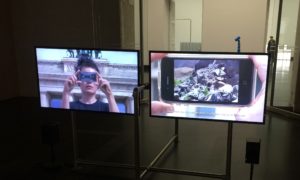
“This is where my friend Andrea Wolf was killed in 1998.” In Abstract (2012), German video artist Hito Steyerl restages the ambiguous juxtaposition of “Berlin” and “Kurdistan” that characterises her earlier essay film November (2004). Steyerl returns to the forensic site in Eastern Turkey of the missile strike said to have killed Wolf and around forty members of the Kurdistan Workers’ Party (PKK). Meanwhile in Berlin, we see Steyerl standing in front of the Brandenburg Gate, her face partially shielded by an iPhone. Moving between Kurdistan and Berlin, shot and countershot, Abstract’s two channels subvert the “grammatical” conceit of cinematic montage to poignantly (re)locate the violence of the military-industrial complex – that which would remain faceless, unseen, abstract.
Available to watch on YouTube.
You can read more in Lawrence Alexander’s Frames Issue 18 article: Facing Off: From Abstraction to Diffraction in Hito Steyerl’s Abstract (2012)
Buddha.mov (Kabir Mehta, India, 2017) by Max Bergmann, PhD candidate at the International Graduate Centre for the Study of Culture (GCSC) at Justus Liebig University Giessen, Germany
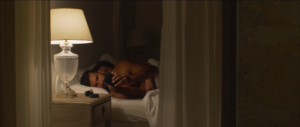
Buddha.mov, a hybrid between documentary and narrative film, a docu-fiction as director Kabir Mehta calls it, seemingly depicts the personal life of a professional cricket player approaching retirement. Besides conventional documentary modes, it integrates smartphone interfaces as overlays and split screens, including chat messaging and dating apps. In this way, the film builds up layers of alleged authenticity, only to increasingly erode them again using the same techniques, blurring the line between fact and fiction. While Buddha.mov becomes an unexpected reflection on documentary cinema and privacy in the age of the smartphone, it leaves viewers unsettled, unsure of what they’ve just seen.
Available to stream on Mubi.
You can read more in Max Bergmann’s Frames Issue 18 article: Interfaces of Fiction: Buddha.mov (2017) and Smartphone Aesthetics
And from the editors:
Punishment Park (Peter Watkins, 1971)
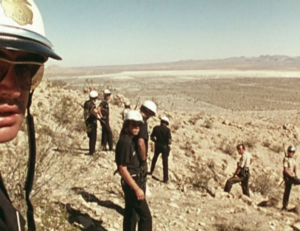
It may seem incongruous to suggest a film made three decades before the first commercially available camera phone, but Peter Watkins’ incendiary pseudo-documentary Punishment Park expresses in embryonic form the utopian promises of the technology as witness, connected through social media to an international network vaster than previous generations could ever have dreamt. In an alternate United States, political dissidents must cross a scorching desert with the National Guard snapping at their heels to reach an American flag and win their freedom. Almost inevitably, the film closes with a mess of police brutality and the clipped tones of the cameraman berating the gloating officers: “We can see you! We’re recording this! The whole world will see this!”
Punishment Park is available on Amazon Prime and on DVD/Blu-ray from the Eureka Masters of Cinema label.
Born, Unborn and Born Again (다신, 태어나, 다시, Kyuri Jeon, 2020)
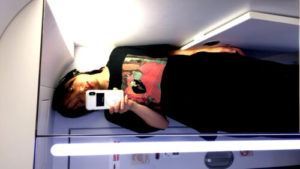
This short essay film by South Korean artist Kyuri Jeon explores her nation’s recent decriminalisation of abortion in the context of its history of sex-selective pregnancy termination and femicide. Jeon’s use of phone footage serves as evidence of the scale and importance of reproductive rights activism and functions as a way of mediating the deeply personal connection the artist has to the issue. The film demonstrates how the phone camera works today as the primary means of seeing and understanding ourselves, our bodies, and the ways in which our complicated family lives unfold through screens.
To view upcoming virtual screenings, or to request the film, visit http://kyurijeon.com.
Fruitvale Station (Ryan Coogler, 2013)
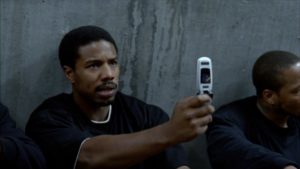
Ryan Coogler’s debut recounts the final 24 hours of Oscar Grant, fatally shot on New Year’s Day 2009 by a Bay Area Rapid Transit police officer at the Fruitvale district station. A story more pressing than ever, Fruitvale Station aims to show Grant as a real-life person with his own everyday challenges, downfalls, and moments of hope, rather than just another name to be read out on the news. Seemingly a conventional biographical drama, the film jolts us with the inclusion of the actual phone footage of the shooting, transgressing the boundaries of fiction and transforming the film into a powerful activist work which urges the audience to stand against racial injustice and police brutality.
Streaming on Netflix and available for rent on Prime Video.
Tangerine (Sean Baker, 2015)
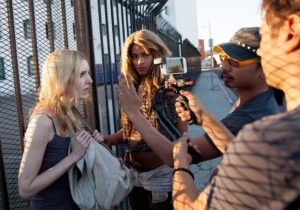
Shot exclusively on iPhone 5s, Tangerine shows the vibrant trans street culture of Los Angeles in an immersive and innovative way. The film’s cinematography presents unconventional framing, with high contrast and no shot scales, which together become a deliberate method for telling a familiar story but with unfamiliar characters. The phone camera here serves as a self-reflexive tool, revealing the problems of sensationalising trans characters and instead using the medium to present gender as an unstable concept.
Sean Baker’s phone camera indie is streaming on Prime Video.
Welcome to Chechnya (David France, 2020)
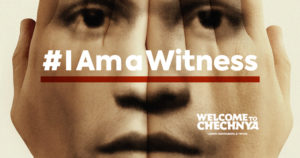
This terrifying documentary film captures the daily persecutions suffered by the Chechen LGBTQ community. Shot in secret, with the phone camera just one of many other hidden cameras, I am a Witness follows the work of activists helping to rescue people from abuse, torture, even death. The phone footage included presents the viewer with powerful evidence, documenting the unimaginable acts of brutality that LGBTQ people suffer. Although difficult to watch, the film makes powerful and creative use of modern technology to reveal the great danger of institutionalised discrimination while securing the anonymity of its participants.
Available to watch on: BBC Storyville.
Love Sex Aur Dhokha (LSD)/ Love Sex and Betrayal (Dibakar Banerjee, 2010)
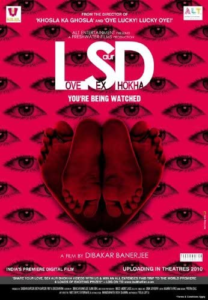
This fiction film uses portable (and covert) video and CCTV cameras to reflect both the documentary and destructive potential of technologies — not least the phone camera. The unnoticed camera shows the ‘ugly spaces’ within society: a woman and her lower-class husband murdered by her family in an honour killing; a man deceiving his female colleague into making a sex tape, shared via MMS and the Web (inspired by a real life case); and a starlet’s sting-operation of a lecherous and exploitative rockstar. The unembellished nature of the footage highlights the technology’s ability to access space and therefore interpolate itself into politics and debates, to an extent impossible for more traditional forms of documentary footage. However, the depiction of unassuming victims in the film also highlights how the technology is not free from manipulation and misuse.
Love Sex Aur Dhoka is currently not available on any official streaming platform.
Searching (Aneesh Chaganty, 2018)

An innovative debut feature from a former Google promo director, Searching stars John Cho as a man hunting for his missing 16-year old daughter. From its opening montage of selfies of the apparently happy family, Searching tells its story entirely through the smartphone and laptop screens that increasingly mediate our relationships, and perhaps obscure their lived complexities. More crowd-pleasing and perhaps less incendiary than most on this playlist, Searching embeds a nuanced take on the place of technology in the lives and personas we make for ourselves within a satisfying mystery/thriller narrative and a striking visual style.
Searching is available to buy or rent on Youtube.
*
Frames Cinema Journal (ISSN 2053-8812) is a biannual, peer-reviewed, online academic journal which aims to provide a space for trailblazing research by scholars of film, media and screen studies. Each issue of Frames is committed to expanding the boundaries of film studies by publishing scholarship which is reflective of exciting new developments in the field. Established in 2012, it is coordinated and edited by the postgraduate students of the Department of Film Studies, University of St Andrews, UK.
